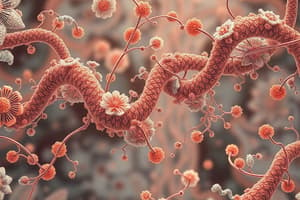Podcast
Questions and Answers
Which type of operon is normally in an 'on' state and is inhibited by the presence of tryptophan?
Which type of operon is normally in an 'on' state and is inhibited by the presence of tryptophan?
- Repressible Operon (correct)
- Inducible Operon
- Constitutive Operon
- Polygenic Operon
What is the role of the CAP-cAMP complex in the lac operon under low glucose conditions?
What is the role of the CAP-cAMP complex in the lac operon under low glucose conditions?
- Enhances transcription (correct)
- Promotes corepressor activity
- Inhibits RNA polymerase activity
- Decreases repressor binding
Which element is considered a cis-acting element that can increase transcription by interacting with activators?
Which element is considered a cis-acting element that can increase transcription by interacting with activators?
- Promoter
- Core promoter
- Enhancer (correct)
- Silencer
What function do RNA binding proteins serve in translational regulation?
What function do RNA binding proteins serve in translational regulation?
Which modification to histones generally leads to increased transcription by loosening the chromatin structure?
Which modification to histones generally leads to increased transcription by loosening the chromatin structure?
Which of the following accurately describes transcriptional regulation by the mediator complex?
Which of the following accurately describes transcriptional regulation by the mediator complex?
In the trp operon, what occurs in the absence of tryptophan?
In the trp operon, what occurs in the absence of tryptophan?
Which of the following statements about alternative splicing is correct?
Which of the following statements about alternative splicing is correct?
Which factor primarily regulates the binding of repressors in the operon model?
Which factor primarily regulates the binding of repressors in the operon model?
What effect does DNA methylation generally have on transcription?
What effect does DNA methylation generally have on transcription?
What is the role of inducers in the context of regulated gene expression?
What is the role of inducers in the context of regulated gene expression?
What does the presence of core promoters indicate in transcription regulation?
What does the presence of core promoters indicate in transcription regulation?
Which of the following best describes the function of small interfering RNA (siRNA) in gene expression?
Which of the following best describes the function of small interfering RNA (siRNA) in gene expression?
What is the primary role of enhancers in gene regulation?
What is the primary role of enhancers in gene regulation?
What type of RNA molecule is involved in degrading mRNA through perfect complementarity?
What type of RNA molecule is involved in degrading mRNA through perfect complementarity?
Which gene is known for regulating cell signaling and is commonly mutated in cancer?
Which gene is known for regulating cell signaling and is commonly mutated in cancer?
How does phosphorylation affect the Retinoblastoma (Rb) protein?
How does phosphorylation affect the Retinoblastoma (Rb) protein?
What is the '2-Hit' model of cancer development?
What is the '2-Hit' model of cancer development?
What is the primary function of tumor-suppressor genes?
What is the primary function of tumor-suppressor genes?
Which of the following describes the effect of glucocorticoid hormones on gene activation?
Which of the following describes the effect of glucocorticoid hormones on gene activation?
What is the mechanism of action for RNA binding proteins in translational regulation?
What is the mechanism of action for RNA binding proteins in translational regulation?
What is one characteristic that differentiates oncogenes from proto-oncogenes?
What is one characteristic that differentiates oncogenes from proto-oncogenes?
What defines the role of metallothionein IIA gene (hMTIIA)?
What defines the role of metallothionein IIA gene (hMTIIA)?
Flashcards
Enhancers
Enhancers
DNA regions that increase gene transcription by interacting with activators. They can form enchancesomes, enhancing the effect further.
Silencers
Silencers
DNA regions that decrease gene transcription by interacting with repressors.
Trans-Acting Elements
Trans-Acting Elements
Proteins that bind to cis-acting elements like enhancers and silencers to regulate gene transcription.
Alternative Splicing
Alternative Splicing
Signup and view all the flashcards
RNA Interference (RNAi)
RNA Interference (RNAi)
Signup and view all the flashcards
MicroRNAs (miRNAs)
MicroRNAs (miRNAs)
Signup and view all the flashcards
Oncogene
Oncogene
Signup and view all the flashcards
Tumor-Suppressor Gene
Tumor-Suppressor Gene
Signup and view all the flashcards
Retinoblastoma Gene (Rb)
Retinoblastoma Gene (Rb)
Signup and view all the flashcards
P53
P53
Signup and view all the flashcards
Gene Expression
Gene Expression
Signup and view all the flashcards
Constitutive Gene Expression
Constitutive Gene Expression
Signup and view all the flashcards
Regulated Gene Expression
Regulated Gene Expression
Signup and view all the flashcards
What is an operon?
What is an operon?
Signup and view all the flashcards
Promoter
Promoter
Signup and view all the flashcards
Operator
Operator
Signup and view all the flashcards
Inducible Operon
Inducible Operon
Signup and view all the flashcards
Repressible Operon
Repressible Operon
Signup and view all the flashcards
Regulatory Gene
Regulatory Gene
Signup and view all the flashcards
Repressor Protein
Repressor Protein
Signup and view all the flashcards
Activator Protein
Activator Protein
Signup and view all the flashcards
Lac Operon
Lac Operon
Signup and view all the flashcards
Cis-acting Elements
Cis-acting Elements
Signup and view all the flashcards
What are some examples of trans-acting elements?
What are some examples of trans-acting elements?
Signup and view all the flashcards
Study Notes
Gene Expression
- Constitutive: Genes expressed constantly, encoding essential proteins.
- Regulated: Genes expressed in response to environmental changes.
- Operons: Sets of genes transcribed together, producing polycistronic mRNA for multiple proteins.
- Promoter: RNA polymerase binding site.
- Operator: Repressor protein binding site.
- Inducible Operons: Usually off, activated by inducers (like lactose)
- Repressible Operons: Usually on, inhibited by corepressors (like tryptophan).
Regulatory Genes
- Encode proteins that control gene expression. (Trans-acting)
- Repressors: Bind the operator to block transcription.
- Inducers: Promote transcription by disabling repressors.
- Corepressors: Inhibit transcription by enabling repressors..
- Activators: Enhance transcription by promoting RNA polymerase binding.
- Inhibitors: Inhibit transcription by disabling activators.
Lac Operon (Inducible)
- No Lactose: Repressor blocks transcription.
- Lactose Present: Allolactose (inducer) binds repressor, allowing transcription.
- Cis-acting elements: Physically attached to the gene (e.g., lacO - operator, lacP - promoter).
- Trans-acting genes: Control genes located elsewhere (e.g., lacI - encodes repressor).
- Structural genes: Encode proteins involved in lactose metabolism (e.g., lacZ encodes β-galactosidase, lacY encodes permease, lacA encodes transacetylase).
- CAP-cAMP: Low glucose stimulates cAMP (high levels), enhancing transcription. High glucose reduces cAMP, reducing transcription.
Trp Operon (Repressible)
- No Tryptophan: Transcription active, synthesizing enzymes.
- Tryptophan Present: Tryptophan acts as a corepressor, enabling the repressor, blocking transcription.
Chromatin Remodeling
- Histone Acetylation: Loosens chromatin, allowing transcription.
- DNA Methylation: Inhibits activator binding, compacts chromatin, decreases transcription, often at CpG islands.
- Histone Methylation: Activators bind enhancers, increasing transcription; repressors bind silencers, decreasing transcription.
- Mediator Complex: Coordinates regulatory proteins and RNA polymerase; regulates transcription initiation/elongation.
Promoters
- DNA sequences where transcription begins.
- Core Promoter: Contains the TATA box (critical for binding).
- Proximal Promoter: Closer to the start site, contains CCAAT box, GC boxes (enhance transcription).
- Distal Promoter: Farther from the start site, includes enhancers and silencers.
Cis-Acting Elements
- DNA sequences regulating nearby genes.
- Enhancers: Increase transcription.
- Silencers: Decrease transcription.
Trans-Acting Elements (Proteins)
- Proteins interacting with cis-elements to regulate transcription.
- Zinc Finger, Helix-Turn-Helix, Leucine Zipper, Helix-Loop-Helix: Different protein motifs for binding specific DNA sequences.
Post-Transcriptional Regulation
- Alternative Splicing: Different protein products from a single gene.
- RNA Editing: Changing mRNA sequence after transcription.
- RNA Interference (RNAi): Small RNA molecules degrade mRNA, or block translation.
- MicroRNAs (miRNAs): Endogenous; partial complementarity inhibits translation.
- Small Interfering RNA (siRNA): Exogenous; perfect complementarity degrades mRNA.
Translational Regulation
- RNA Binding Proteins: Regulate translation efficiency/stability by binding mRNA 5' UTR.
Applications (Examples)
- Glucocorticoid Hormones: Regulate genes via hormone response elements.
- GloFish: Fluorescent genes (GFP/RFP) with constitutive promoters for monitoring/decoration.
- Metallothionein IIA: Protein for heavy metal binding, responsive to heavy metal response elements (MREs).
Cancer Development
- Definition: Uncontrolled cell growth.
- Causes: Oncogene activation, tumor suppressor inactivation.
- Characteristics: Altered shape, lack of contact inhibition, metastasis.
- Cell Cycle Regulation: Controlled by cyclins and CDKs.
- Knudson's "Two-Hit" Model: Cancer requires multiple mutations (both alleles of a tumor suppressor must be inactivated).
- Proto-Oncogenes and Oncogenes: Proto-oncogenes promote normal cell division, oncogenes cause uncontrolled growth; Ras gene is an example.
- Dominant mutations; only one allele needs to be mutated.
- Tumor Suppressor Genes: Regulate cell cycle and/or repair; loss leads to uncontrolled growth.
- Examples include Rb gene (prevents cell cycle progression), and p53 gene (halts cell cycle or apoptosis).
Studying That Suits You
Use AI to generate personalized quizzes and flashcards to suit your learning preferences.




